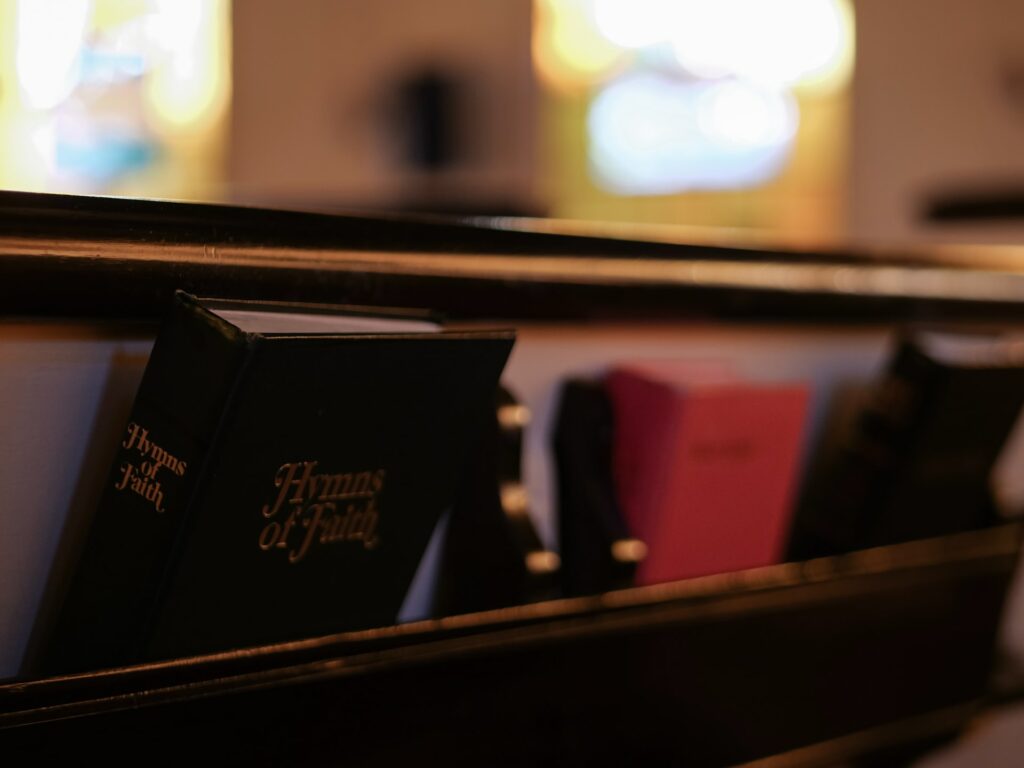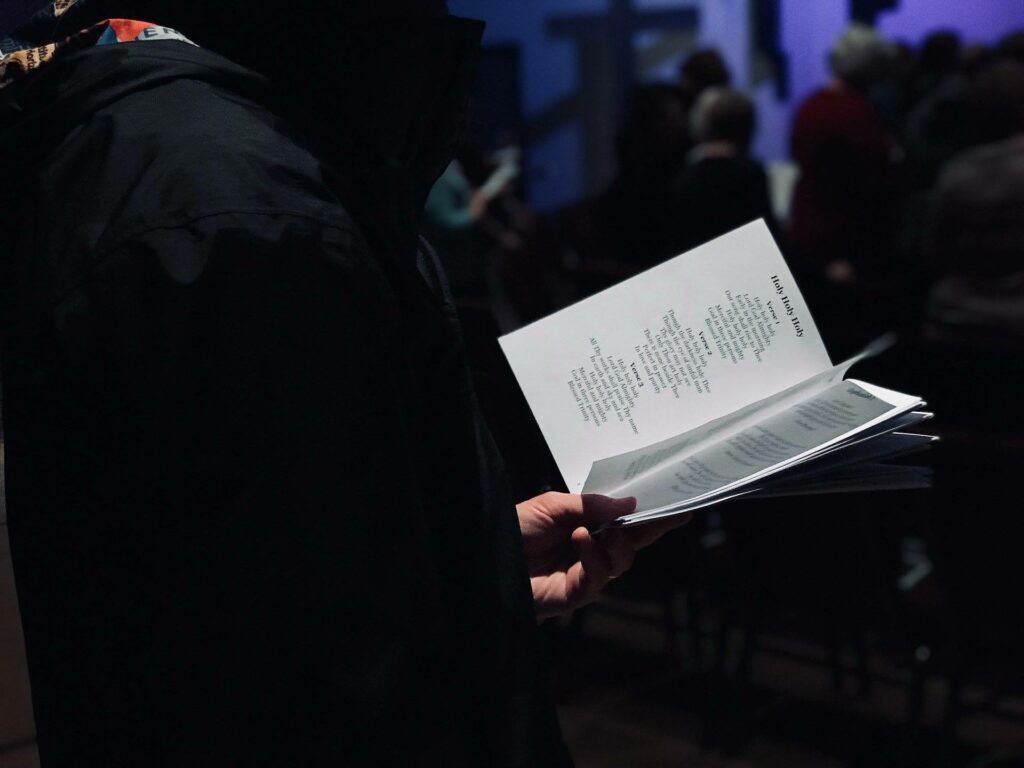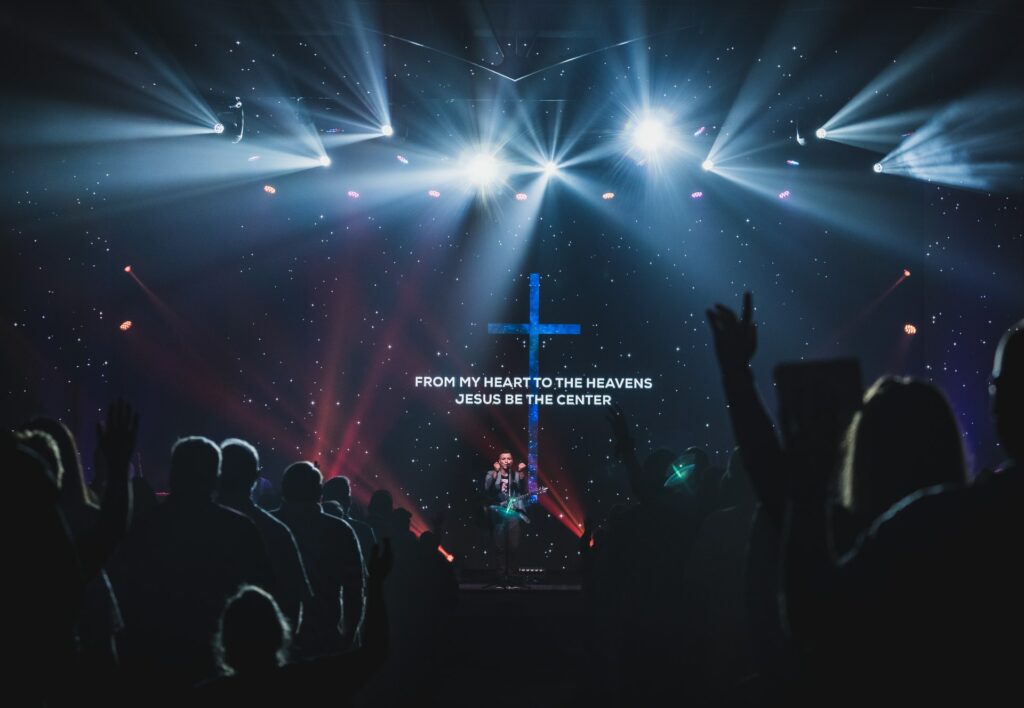Worship—A Pentecostal Perspective IV
BIBLICAL KEYS TO WORSHIP
The Music of Worship
This is the fourth in a series of articles exploring worship from a Pentecostal perspective. It has been established that true, Pentecostal worship is not a particular cultural expression of music or ceremony. Rather, it is a biblical expression that finds voice in any culture where worshipers yield to the  leadership of the Holy Spirit. Pentecostal worship is led and empowered by the Holy Spirit.
leadership of the Holy Spirit. Pentecostal worship is led and empowered by the Holy Spirit.
Previous articles have explored scriptures on the human need for and the divine response to worship and the sacrificial nature of worship. This article will take a look at scriptures guiding us in the selection and use of songs in worship. This is certainly one of the most crucial areas of the worship debate and perhaps the most dangerous topic. People are protective of their music. When the style of music becomes the most important single factor in the worship experience, the pastor and the worship leader are walking in a minefield. They never know which step they take may cause an explosion. Let us turn to the Bible to see if we can find more light and less heat.
The Music of Worship
Do not get drunk on wine, which leads to debauchery. Instead, be filled with the Spirit. Speak to one another with psalms, hymns and spiritual songs. Sing and make music in your heart to the Lord, always giving thanks to God the Father for everything, in the name of our Lord Jesus Christ. Submit to one another out of reverence for Christ. Eph 5:18-21(NIV)
Let the word of Christ dwell in you richly as you teach and admonish one another with all wisdom, and as you sing psalms, hymns and spiritual songs with gratitude in your hearts to God. And whatever you do, whether in word or deed, do it all in the name of the Lord Jesus, giving thanks to God the Father through him. Col 3:16-17(NIV)
These passages are the heart of the New Testament on the music of worship. It would have been enough for the “psalms, hymns, and spiritual songs” command to appear once. But here it is twice and in two surprising and complimentary contexts: once in relation to staying filled with the Spirit and the second time in reference to the working of the Word of God in our lives–Spirit and Truth! This is the repertoire the Father is listening for. Important factors that determine the success of our use of these songs in worship must be noted:
The importance of the heart: “Sing and make music in your heart to the Lord” “with gratitude in your hearts to God”
Gratitude to God: “always giving thanks to God the Father for everything,” “with gratitude”
Submission to God and others: “Submit to one another out of reverence for Christ.” “Teach and admonish one another”
The crucial role of wisdom: “for Christ.” “with all wisdom”
The inclusion of others: “Speak to… submit to… teach and admonish… one another”
The direction of the music: “to the Lord” “to God” “to God” “to God”
Before we discuss what “psalms, hymns, and spirituals songs” means to us, we see that the attitudes and intentions of those singing and making music are absolutely crucial to the process. To sum up these worship beatitudes:
- We must sing and make music to God, not to men.
- At the same time, we must be sensitive to those worshiping with us.
- We must be wise.
- We must submit our hearts to God and our brothers and sisters.
- We must sing and play from a heart of profound gratitude to God.
If our “worship” music making is done from a heart of pride, if it is done for people, if it is done carelessly and foolishly, or if it is done selfishly, with little or no regard for those around us, our song selection may be biblical but the music we make will never reach the Father’s ears or touch His heart. “‘These people honor me with their lips, but their hearts are far from me.” Matt 15:8(NIV)
Psalms, hymns, and spiritual songs. According to Vines Dictionary of New Testament words, psalms are sacred songs with instrumental accompaniment. Hymns are songs of praise addressed to God, and spiritual songs are songs with a special touch of the Holy Spirit upon them. I believe these definitions are as close as we can get the Paul’s intentions when he wrote these parallel passages. We are much more familiar the definitions we have substituted: Psalms are scriptures songs; hymns are old songs in books, and spiritual songs are the lively ones. It will be most helpful to examine the biblical meanings.
accompaniment. Hymns are songs of praise addressed to God, and spiritual songs are songs with a special touch of the Holy Spirit upon them. I believe these definitions are as close as we can get the Paul’s intentions when he wrote these parallel passages. We are much more familiar the definitions we have substituted: Psalms are scriptures songs; hymns are old songs in books, and spiritual songs are the lively ones. It will be most helpful to examine the biblical meanings.
Psalms are more than just selections from the book of Psalms, although these are certainly included. Psalms are sacred songs–songs set apart to God. We can find them anywhere, in scripture or from composers, and in any style. The important thing is they are for God, and they are about God–sacred. Much Christian music is for us and about us, but these songs are not psalms. Psalms are built on the pattern of the book of Psalms. They are real and revealing. They express God’s nature and man’s heart. They proclaim God’s glory and life’s enigmas. Psalms are emotional and rational, repetitive and exhaustive, personal and congregational, joyful and sorrowful, encompassing a subject range that covers all of life.
Another important characteristic of biblical psalms is that they are designed to be accompanied by instruments. Not tapes–instruments, played by instrumentalists. One the greatest crises in the church today is the lack of instrumentalists. There are many factors behind this, but in large measure, we don’t have instrumentalists because we don’t use them. Instrumentalists are developed by letting them play, giving them room to grow. All of us who now can play in church, were once young people that somebody let play in church when we were not so skillful. Churches have become singer-centered, letting technology take the place of the instrumentalist. This is far from the heart of God. The Ephesians passage says, “sing–and make music”. But we have been content to sing to the music that others have recorded. While this may be a stage that a developing congregation may pass through, this will never suffice on the long term for public worship.
 If we are to make our songs, “sacred” by setting them apart to God, we must be flexible, able to follow the flow of the Holy Spirit. It takes living, breathing people to do that; instrumentalists and vocalists who are sensitive to the voice of God. Pastors, music pastors, and worship leaders must take seriously the development of instrumentalists. The first type of biblical song, the psalm, demands it.
If we are to make our songs, “sacred” by setting them apart to God, we must be flexible, able to follow the flow of the Holy Spirit. It takes living, breathing people to do that; instrumentalists and vocalists who are sensitive to the voice of God. Pastors, music pastors, and worship leaders must take seriously the development of instrumentalists. The first type of biblical song, the psalm, demands it.
What musical term is more controversial in the church today than “hymn”? When Paul wrote about hymns, did he mean “Melodies of Praise” or “Hymns of Glorious Praise”? We can be sure that 50 to 100 year-old songs in a hardback book were not what Paul had in mind when he used the word “hymn”. According to Vines, he meant songs of praise addressed to God. We’ve already established that psalms are songs of praise. The elevating difference about hymns is that they are addressed to God. According to these parallel passages, all our singing and music making must be made to God, but hymns are addressed to Him. In other words, biblical hymns are songs of prayer. This is so close to the heart of God. There is a deeper, more powerful dimension to a prayer that is sung buy a congregation. When Jesus cleansed the Temple, he quoted Isaiah saying that the Father’s house would be a house of prayer for all nations. The word Isaiah used was the Hebrew word for hymn. In other words, a mark of the house of God is that it is a place where prayers are sung. In the synagogue prayers, usually from the Psalms, were chanted by the congregation. This practice became a part of first century Christian worship and has continued through the ages. As musical styles developed, songs of prayer developed as well. This is one of the common factors of the historic hymns written since the Reformation and the contemporary songs of today’s praise and worship movement. So many of the great songs are addressed to God, not to man; they are songs of prayer. Compare My Jesus I Love Thee with I Love You, Lord. The musical differences reflect the hundred years or so of musical tradition that separate them. But the heart of each song is the same and each song is addressed directly to God. Some say that when we stop singing about God and start singing to Him we have gone from praise to worship. I don’t see it as quite that simple, but it is an important transition in every set of songs and contributes to some of the most important moments in any worship service.
Much passion is put into the argument over hymns (old songs in books) and choruses (new songs, words projected) by either camp that would exclude the other. I long to see that much passion spent instead in the presentation of real hymns–songs of prayer to God, whether they were written a hundred years ago or that afternoon. What great visitations from God each worship service would bring! This biblical understanding of hymns is essential to the process of bringing cultural and intergenerational peace to the church.
essential to the process of bringing cultural and intergenerational peace to the church.
The power intensifies further with “spiritual songs”. Sacred songs with instruments addressed to God can also be touched with the power of the Holy Spirit. The Spirit’s power should be present on every psalm and hymn so what is the need of another genre? To this point the Bible is instructing us in the use of composed songs. We are quite dependent upon them but the Holy Spirit is not. As wonderful as composed psalms and hymns can be, there are times when these are too limiting to the Holy Spirit. He wants to lead us in a deeper and more personal expression unlimited by the words and melodies of human composition. When worshipers begin to improvise their own musical expressions of worship, the Holy Spirit can breathe through an entire congregation to create a symphony of worship unique to that moment and place. Many times the gifts of the Spirit will flow in these moments and the Lord will speak vital things to the fellowship. This level of worship requires a knowledgeable, skillful, and willing congregation. This doesn’t happen by accident. It happens when the Holy Spirit opens the hearts of the singers and instrumentalists, who have a key role in releasing this song of the Lord, and the hearts of the leaders and people to this ministry.
As a worship leader, my passion is to see these biblical songs at work in our congregation. Whether I think the songs as hymns or choruses, if they are new songs are old songs, fast or slow, I know what the Father is looking for–psalms, hymns, and spiritual songs. God is listening for us to sing material like that found in the Bible, psalms that proclaim His excellence and our joy, hymns that unite us in prayers, and spiritual songs that lift the curtain of time and human limitation enabling us to sing in the realm of the Spirit. This is so much more important than whether we are singing songs from this or some other century, from the book or off a screen, upbeat or downbeat, with full orchestra or a cappella.
Paul gives us more insight into worship singing in II Corinthians 14:15. “I will sing with my spirit and I will sing with my understanding.” This is another application of the spirit-and-truth teaching of Jesus. Paul’s example helps us break the bounds of our own personalities. There are worshipers who might be called “spirit people”. They love new songs and new experiences. Logic is not their compass; intuition guides them through life and certainly through worship. They love simple, sing-able, tunes without a lot of verses to bother with. They can stand for hours at a time.
Seated near them in the sanctuary is a different kind of worshiper, the “truth people”. They like and respect verses, the more the better for they want to go deep into the truth of a song. They like great, old songs that have stood the test of time. They like comfortable and familiar tunes and forms of worship. They distrust emotion and savor the truths of worship.
When I lead worship, I have to lead both of these groups. If I allow either group to identify me as member of the opposite camp, I may not be able to lead them in worship. Neither can I allow my personal preferences to become a barrier between the worshipers I want to lead and me. I must set and follow Paul’s example. When “spirit songs” are in order, simple songs, I must sing them with all my heart. When “truth songs” are up, more complex  songs, I have to sing them the same way. We must teach people not to let their personal preferences get in the way of their worship. The essential thing is to give thanks, to proclaim the Lord’s excellence, to express our love for God, to pray anointed prayers together, to allow the Holy Spirit to lead us as we worship, and to commune with the Almighty. If we only worship or lead worship from the standpoint of the songs we like, our preferences become comfort zones; limiting factors and possibly barriers between us and God. True worship will break us out of these comfort zones.
songs, I have to sing them the same way. We must teach people not to let their personal preferences get in the way of their worship. The essential thing is to give thanks, to proclaim the Lord’s excellence, to express our love for God, to pray anointed prayers together, to allow the Holy Spirit to lead us as we worship, and to commune with the Almighty. If we only worship or lead worship from the standpoint of the songs we like, our preferences become comfort zones; limiting factors and possibly barriers between us and God. True worship will break us out of these comfort zones.
There is work for all of us to do: the “spirit person” must learn to respect the song that has a history and the “truth person” must learn to honor the song of the moment. Simple songs that allow our spirits to soar in worship need to be embraced by “truth people” and complex songs that really cover a subject need to be embraced by the “spirit people”. Emotional songs and intellectual songs both have their place in worship regardless of whether each worshiper’s personality prefers them.
Intergenerational peace is a prime goal of the worship leader. The Kingdom of God is the one place where the old and young folks are supposed to get along. “One generation will commend your works to another; they will tell of your mighty acts.” Ps 145:4(NIV) “Then we your people, the sheep of your pasture, will praise you forever; from generation to generation we will recount your praise.” Ps 79:13(NIV). The only way to achieve this biblical ideal is for the older people to take the lead. We are the mature ones; it is up to us to establish an atmosphere of acceptance. Sadly, though, it is the older saints who sometimes can’t seem to find room in their hearts for the music of today’s revival. If older folks reject the sincere worship music of younger generations, it is a tragedy. It stand to reason that it is just as immature and selfish to throw out the hymnal as it is to reject all new music. The wise worship leader (Remember the “with all wisdom” clause in the Colossians passage.) will not allow or even contribute to generational strife.
The Bible is clear. We must embrace the new song of today’s move of the Spirit and we must honor the music of previous generations. Unwise leaders can polarize their congregations by treating different music in less than equal ways. Don’t ever “throw the old folks a bone” by singing I’ll Fly Away or some other token old song as if you had to get it out of the way to get to the real songs. This is offensive and counterproductive. Instead, put the old songs together just like you do the new songs. Key flow, style flow, and thought flow help the old songs just like these techniques help new songs. If your treatment of the songs is equal and evenhanded, you are respecting the music of your elders and embracing the song of today. Realize, too, that there is still an anointing on many old songs. While some are products of their culture, many transcend the years and, with careful musical treatment, are still useful today as worship material, not just peace-making efforts. As I have said before, let the songs be about worship. Do not the worship be about the songs. Learn to lead “psalms, hymns, and spiritual songs” “with all wisdom”.
True worship is an encounter with the living God. Encounters with the living God tend to destroy our carefully constructed comfort zones. In the Bible, when believers met the living God the experience tended to move them on in life. Abraham couldn’t stay in Ur nor could Moses stay in the desert. Jacob had to abandon his deceitful nature and the nation of Israel had to evacuate Egypt. David had to leave the sheep pens and Isaiah had to depart the palace of Uzziah. Though the fire didn’t burn them, Shadrack, Mesach, and Abednego had to leave the firey furnace while Daniel could not stay with his close-mouthed friends in the lion’s den. Peter, James and John left their nets at Galilee and Blind Bartemeus his darkness. The lame man could not stay on his bed nor Lazarus in his tomb. Stephen could not be silent and wait tables, he had to preach and so, he fell asleep in a hale of stones. Paul’s stale religion was no resting place; he started for Damascus, encountered Jesus, and ended up in the Kingdom. He and Silas were put in prison but they couldn’t stay nor could Peter remain within the comfort of his racial prejudice. The disciples could not stay in Jerusalem and the church won’t be able to stay on the ground when the trumpet sounds!
Bible, when believers met the living God the experience tended to move them on in life. Abraham couldn’t stay in Ur nor could Moses stay in the desert. Jacob had to abandon his deceitful nature and the nation of Israel had to evacuate Egypt. David had to leave the sheep pens and Isaiah had to depart the palace of Uzziah. Though the fire didn’t burn them, Shadrack, Mesach, and Abednego had to leave the firey furnace while Daniel could not stay with his close-mouthed friends in the lion’s den. Peter, James and John left their nets at Galilee and Blind Bartemeus his darkness. The lame man could not stay on his bed nor Lazarus in his tomb. Stephen could not be silent and wait tables, he had to preach and so, he fell asleep in a hale of stones. Paul’s stale religion was no resting place; he started for Damascus, encountered Jesus, and ended up in the Kingdom. He and Silas were put in prison but they couldn’t stay nor could Peter remain within the comfort of his racial prejudice. The disciples could not stay in Jerusalem and the church won’t be able to stay on the ground when the trumpet sounds!
Stagnant churches are the result of stagnant worship. When we begin to stretch beyond our comfort zones into fully biblical expressions of worship, God will respond. When we seek out and sing psalms and hymns and spiritual songs, He will inhabit our praise and He will be enthroned upon our worship. Every Sunday service should be a stretch into the supernatural, an encounter with the living God. This kind of worship will move the church forward.
Dr. Steve Phifer received a Doctorate in Worship Studies from the Robert E. Webber Institute for Worship Studies. He has taught at Valley Forge University and Southeastern Assemblies of God University. For many years he was the Worship Pastor at Word of Life Church in Alexandria, VA.
More of Dr. Phifer’s materials can be found at stevephifer.com.
